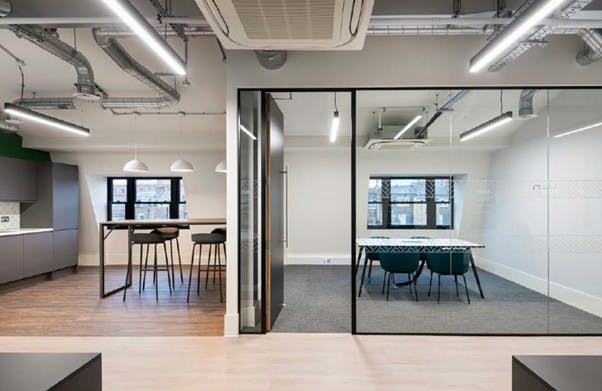As a tenant, you don’t need to hold sustainability certifications yourself — but choosing an office in London that has one can make a real difference to your running costs, employee wellbeing, and corporate image. The three main certifications you’ll see on the market are BREEAM, WELL, and LEED, each covering different aspects of environmental performance and workplace quality.
In 2024, around 65% of new Central London office developments achieved at least one recognised green certification, showing how sustainability has become a standard expectation rather than a luxury feature.
What Are the Main Sustainability Certifications?
| Certification | Focus Area | Typical Benefits for Tenants |
|---|---|---|
| BREEAM (UK) | Building efficiency, energy, and materials | Up to 30% lower energy use |
| WELL (Global) | Employee health and wellbeing | 30% higher workspace satisfaction |
| LEED (US origin) | Energy, water, and carbon efficiency | 25–30% lower running costs |
These certifications give you insight into how efficiently a building operates and how comfortable it is to work in. They don’t directly affect your legal obligations as a tenant, but they do impact your everyday costs and staff experience.

How Does BREEAM Certification Affect Office Costs?
BREEAM (Building Research Establishment Environmental Assessment Method) is the UK’s leading sustainability rating for commercial properties. It assesses a building’s performance in energy use, water management, waste reduction, and wellbeing.
A BREEAM Excellent or Outstanding building typically offers:
Lower energy bills due to advanced heating and cooling systems
Efficient waste and recycling processes
Enhanced air quality and lighting conditions
Research shows that BREEAM Excellent offices use around 30% less energy than standard buildings. While you might pay slightly more in service charges for maintenance of green systems, the long-term savings in utilities and operational efficiency often outweigh these costs.
What Is the WELL Building Standard and Why Does It Matter?
The WELL Building Standard measures how a workspace supports human health and comfort. It focuses on aspects like air quality, lighting, temperature, and acoustics, directly affecting how people feel at work.
WELL-certified offices typically feature:
Clean air through advanced filtration
Access to natural light and ergonomic design
Water systems that meet health standards
Studies show employees in WELL-certified environments report 30% higher satisfaction and fewer sick days. For tenants, this can mean improved productivity and morale — key factors for business performance.
What Does LEED Certification Mean for London Tenants?
LEED (Leadership in Energy and Environmental Design) is a US-based system now common in major London developments. It rates buildings from Certified through Silver, Gold, and Platinum based on energy efficiency and sustainability performance.
LEED-certified offices use 25–30% less energy on average, thanks to efficient lighting, renewable energy systems, and strong insulation. This translates to lower operational costs and a smaller carbon footprint — helping businesses meet environmental targets while saving money.
Do Green-Certified Offices Cost More to Rent?
Yes, certified sustainable offices usually command 5–15% higher rents than non-certified ones. However, tenants often find the additional cost worthwhile because of:
Lower utility bills and maintenance expenses
Healthier, more productive working conditions
A stronger environmental reputation with clients and investors
In competitive areas like the City of London or Canary Wharf, sustainability has become an expectation, meaning the rent gap between certified and non-certified buildings is narrowing. Over a full lease term, the reduced running costs can offset any initial rent premium.
Should You Prioritise Green Certifications When Choosing an Office?
Sustainability certifications shouldn’t be your only deciding factor, but they add clear value. When comparing spaces, ask for:
The building’s Energy Performance Certificate (EPC) rating (ideally A or B)
A two-year record of actual utility and service charge costs
This helps confirm that the building’s sustainability claims lead to genuine financial and environmental benefits.
Certified offices don’t just lower your bills — they help create a healthier, more appealing place to work and a brand that reflects your environmental values.
Contact us for immediate expert advice on eviction notices and commercial tenant rights!
